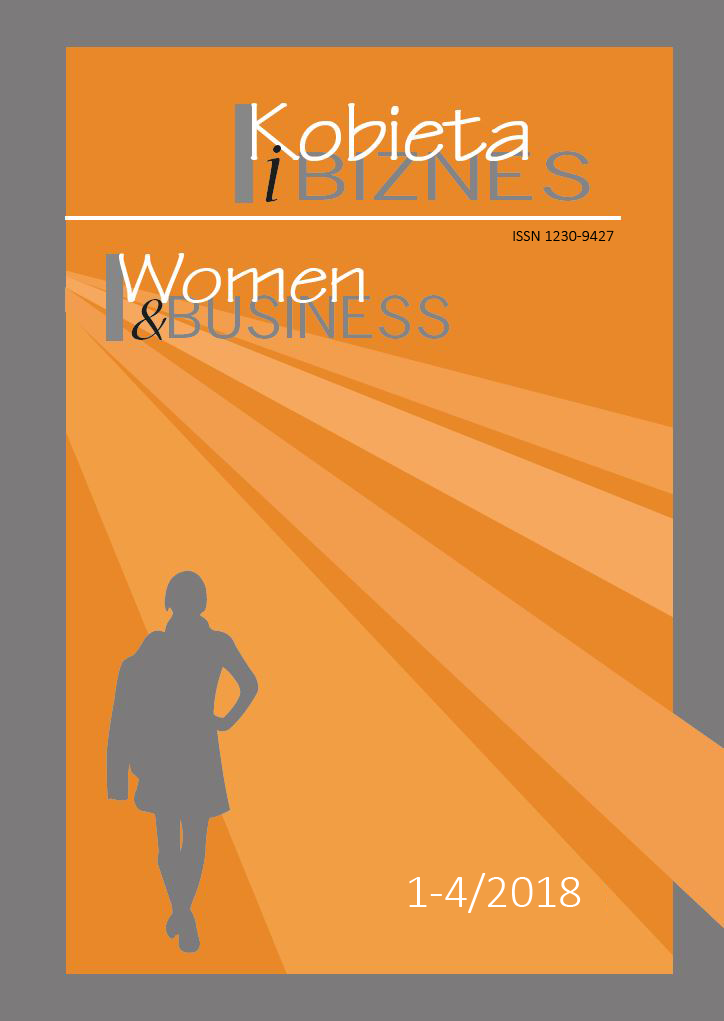Argumenty za sponsoringiem
##plugins.themes.bootstrap3.article.main##
Abstrakt
Sponsoring jest rozwiązaniem wciąż widocznego problemu w zakresie nierówności płci, jakim jest zbyt mała liczba kobiet na wysokich stanowiskach - problemu, który dotyka od dziesięcioleci zarówno sektor prywatny, jak i publiczny w Polsce, Singapurze oraz większości krajów na całym świecie. Prezentowane poniżej wyniki badań pokazują, że sponsoring skutecznie umożliwia awans zawodowy o co najmniej dwa poziomy w hierarchii organizacyjnej. Biorąc pod uwagę fakt, iż sponsoring to wciąż stosunkowo nowe zjawisko, celem niniejszego artykułu jest zdefiniowanie oraz przedstawienie idei sponsoringu, aby więcej osób, zwłaszcza kobiet, mogło z niego skorzystać.(fragment tekstu)
##plugins.themes.bootstrap3.article.details##
Autor (Autorzy) artykułu oświadcza, że przesłane opracowanie nie narusza praw autorskich osób trzecich. Wyraża zgodę na poddanie artykułu procedurze recenzji oraz dokonanie zmian redakcyjnych. Przenosi nieodpłatnie na Oficynę Wydawniczą SGH autorskie prawa majątkowe do utworu na polach eksploatacji wymienionych w art. 50 Ustawy z dnia 4 lutego 1994 r. o prawie autorskim i prawach pokrewnych – pod warunkiem, że praca została zaakceptowana do publikacji i opublikowana.
Oficyna Wydawnicza SGH posiada autorskie prawa majątkowe do wszystkich treści czasopisma. Zamieszczenie tekstu artykuły w repozytorium, na stronie domowej autora lub na innej stronie jest dozwolone o ile nie wiąże się z pozyskiwaniem korzyści majątkowych, a tekst wyposażony będzie w informacje źródłowe (w tym również tytuł, rok, numer i adres internetowy czasopisma).
Osoby zainteresowane komercyjnym wykorzystaniem zawartości czasopisma proszone są o kontakt z Redakcją.
Autor zgadza się na dalsze udostępnianie pracy wg wymagań licencji CC-BY-NC
Bibliografia
2. DeFillippi R.J., Arthur M.B. [1994], The boundaryless career: A competency-based perspective, "Journal of Organisational Behaviour", 15 (4), 307-324.
3. Denzin N.K. [2006], Analytic autoethnography, or déjà vu all over again, "Journal of Contemporary Ethnography", 35 (4), 419-428.
4. Ehrlinger J., Dunning D. [2003], How chronic self-views influence (and potentially mislead) estimates of performance, "Journal of Personality and Social Psychology", 84 (1), 5-17.
5. Eisenhardt K.M. [1989], Building theories from case study research, "Academy of Management Review", 14 (4), 532-550.
6. Friday E., Friday S.S., Green A.L. [2004], A reconceptualisation of mentoring and sponsoring, "Management Decision", 42 (5), 628-644.
7. Hewlett S.A. [2013], Forget a mentor. Find a sponsor: The new way to fast-track your career, Harvard Business Review Press.
8. Ibarra H., Carter N.M., Silva C. [2010], Why men still get more promotions than women, "Harvard Business Review", 88 (9), 80-85.
9. Ibarra H., Obodaru O. [2009], Women and the vision thing, "Harvard Business Review".
10. Kram K.E. [1983], Phases of the mentor relationship, "Academy of Management Journal", 26 (4), 608-625.
11. Kram K.E., Isabella L.A. [1985], Mentoring alternatives: The role of peer relationships in career development, "Academy of Management Journal", 28 (1), 110-132.
12. Marcinkus Murphy W. [2012], Reverse mentoring at work: Fostering cross generational learning and developing millennial leaders, "Human Resource Management", July-August, 51 (4), 549-573.
13. Noe R.A. [1988], An investigation of the determinants of successful assigned mentoring relationships, "Personnel Psychology", 41, 457-478.
14. Pfeffer J. [1998], The human equation: Building profits by putting people first, Harvard Business Press.
15. Reskin B.F. [1979], Academic sponsorship and scientists' careers, "Sociology of Education", 52, 129-146.
16. Scandura T.A. [1992], Mentorship and career mobility: An empirical investigation, "Journal of Organisational Behaviour", 13 (2), 169-174.
17. Tuminez A.S., Duell K., Majid H.A. [2012], Rising to the top?: A report on women's leadership in Asia, Lee Kuan Yew School of Public Policy, National University of Singapore, http://sites.asiasociety.org/womenleaders/wp-content/uploads/2012/04/Rising-to-the-Top.pdf
18. Wall S. [2008], Easier said than done: Writing an autoethnography, "International Journal of Qualitative Methods", 7 (1), 38-53.
19. Wayne S.J., Liden R.C., Kraimer M.L., Graf I.K. [1999], The role of human capital, motivation and supervisor sponsorship in predicting career success, "Journal of Organisational Behaviour", 20 (5), 577-595.
20. Yin R.K. [1981], The case study crisis: Some answers, "Administrative Science Quarterly", 26, 58-65.
21. Yin R.K. [2014], Case study research: Design and methods, Sage Publication, London

